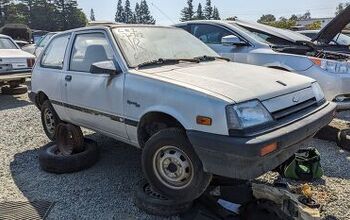UK Vehicle Registrations Fall Into Bottomless Pit

Despite manufacturers still managing to turn a profit, the automotive sector hasn’t been in the best of health these last few years. Growth appears to have plateaued in most Western nations, encouraging companies to cater this business toward other markets, supply chains have also been negatively impacted by the pandemic — with semiconductor shortages hindering production schedules on a scale we’ve not seen since the Great Recession.
It’s a bad situation and rumored to get worse if the warning cries of economists are to be believed. But there’s also mounting evidence to support their claims. The Society of Motor Manufacturers and Traders (SMMT) recently reported that vehicle registrations in the United Kingdom fell by roughly 35 percent in September vs the same timeframe in 2020. This is relevant because the month typically represents the second-busiest period for the country and numbers were already low due to production stops created by coronavirus lockdowns.
Stacked against the region’s 10-year average, UK September sales are actually down by almost 45 percent.
“This is a desperately disappointing September and further evidence of the ongoing impact of the Covid pandemic on the sector. Despite strong demand for new vehicles over the summer, three successive months have been hit by stalled supply due to reduced semiconductor availability, especially from Asia,” Mike Hawes, SMMT chief executive, told the Financial Times this week.
From FT:
Dealers reported 215,312 new vehicles registrations last month, 34 per cent down on September last year — when sales were also hit hard by the coronavirus lockdown — and an almost 45 per drop on the pre-pandemic 10-year average. The sales figure is the lowest since the “two-plate” system was introduced in 1999.
Like other sectors, the auto industry, which was already faced with uncertainty around Brexit, was hit hard by pandemic shutdowns and economic uncertainty.
It has continued to struggle to meet pent-up demand as the economy reopened due to a global shortage of computer chips.
Just about everyone expected September to be a sigh of relief for the industry and proof that car sales were rebounding. But automakers have spent the last couple of months reporting significant sales declines and attempting to be careful where they place the blame. Consumers are allegedly not the problem and have even shown a willingness to pay exorbitant prices for both new and used automobiles.
The industry has instead continued blaming the semiconductor shortage while suggesting buyers are eager to jump into the pool with more savings at the ready than usual. Though when your clientele is flush with cash and still not buying, the finger has to be pointed back at the manufacturer or a hectic, uncertain economy. At least that seems to be the case in the United Kingdom and almost assuredly an explanation that carries over for North America.
But the longer this drags on, the more it appears to be a universal issue.
“After a strong spring selling season, the supply situation has worsened precipitously and is dragging sales down with it,” Cox Automotive Senior Economist Charlie Chesbrough stated on Monday. “Available supply on [American] dealer lots is now 58 [percent] lower than last September, down nearly 1.4 million units.”
One debatably bright spot from the SMMT assessment, however, was an increased take rate of electric vehicles. It reported that over 32,000 new battery-electric cars were registered inside the United Kingdom last month, noting it as a record. Although EVs technically require more semiconductor chips than most modern internal-combustion vehicles — making yours truly wonder how relevant the global chip shortage actually is in the grand scheme of things.
[Image: Gretchen Gunda Enger/Shutterstock]

A staunch consumer advocate tracking industry trends and regulation. Before joining TTAC, Matt spent a decade working for marketing and research firms based in NYC. Clients included several of the world’s largest automakers, global tire brands, and aftermarket part suppliers. Dissatisfied with the corporate world and resentful of having to wear suits everyday, he pivoted to writing about cars. Since then, that man has become an ardent supporter of the right-to-repair movement, been interviewed on the auto industry by national radio broadcasts, driven more rental cars than anyone ever should, participated in amateur rallying events, and received the requisite minimum training as sanctioned by the SCCA. Handy with a wrench, Matt grew up surrounded by Detroit auto workers and managed to get a pizza delivery job before he was legally eligible. He later found himself driving box trucks through Manhattan, guaranteeing future sympathy for actual truckers. He continues to conduct research pertaining to the automotive sector as an independent contractor and has since moved back to his native Michigan, closer to where the cars are born. A contrarian, Matt claims to prefer understeer — stating that front and all-wheel drive vehicles cater best to his driving style.
More by Matt Posky
Latest Car Reviews
Read moreLatest Product Reviews
Read moreRecent Comments
- Peter Buying an EV from Toyota is like buying a Bible from Donald Trump. Don’t be surprised if some very important parts are left out.
- Sheila I have a 2016 Kia Sorento that just threw a rod out of the engine case. Filed a claim for new engine and was denied…..due to a loop hole that was included in the Class Action Engine Settlement so Hyundai and Kia would be able to deny a large percentage of cars with prematurely failed engines. It’s called the KSDS Improvement Campaign. Ever hear of such a thing? It’s not even a Recall, although they know these engines are very dangerous. As unknowing consumers load themselves and kids in them everyday. Are their any new Class Action Lawsuits that anyone knows of?
- Alan Well, it will take 30 years to fix Nissan up after the Renault Alliance reduced Nissan to a paltry mess.I think Nissan will eventually improve.
- Alan This will be overpriced for what it offers.I think the "Western" auto manufacturers rip off the consumer with the Thai and Chinese made vehicles.A Chinese made Model 3 in Australia is over $70k AUD(for 1995 $45k USD) which is far more expensive than a similar Chinesium EV of equal or better quality and loaded with goodies.Chinese pickups are $20k to $30k cheaper than Thai built pickups from Ford and the Japanese brands. Who's ripping who off?
- Alan Years ago Jack Baruth held a "competition" for a piece from the B&B on the oddest pickup story (or something like that). I think 5 people were awarded the prizes.I never received mine, something about being in Australia. If TTAC is global how do you offer prizes to those overseas or are we omitted on the sly from competing?In the end I lost significant respect for Baruth.


































Comments
Join the conversation
That's what happens when you force everyone to buy a more expensive EV. Europe automotive sector will continue to dwindle due to its crazy regulations which now appear to be what Biden wants as well since he has stick in batteries. Its coming
Another reason for registrations being down... Tickets for failing to register disproportionally impact people of color, so some cities (e.g. Minneapolis) are not allowing the police to enforce registration issues. If no one is enforcing registrations, why register?